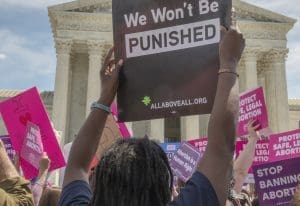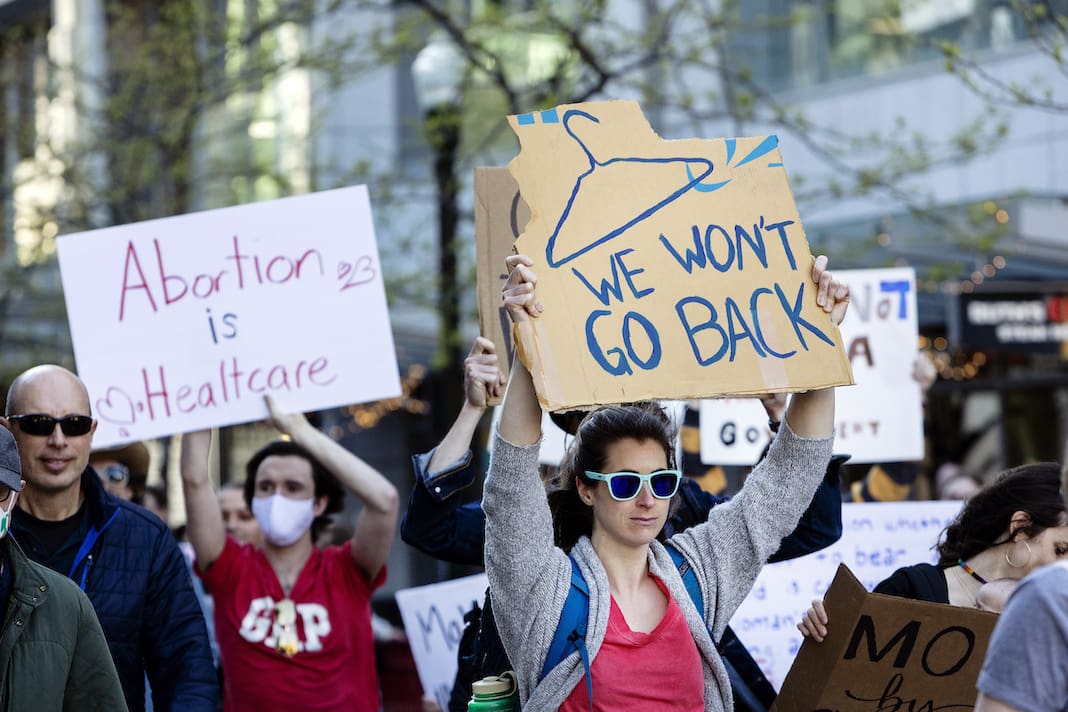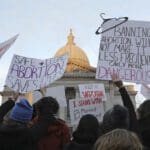GOP attacks on later abortion are especially harmful to Black women
Republicans never talk about who their abortion bans will affect the most.

In the wake of a recent Supreme Court ruling against a Louisiana abortion restriction, conservatives are left to scramble for how to attack abortion next. There’s a good chance that anti-abortion extremists will fall back on one of their major offensives of the past year: attacks on later abortion.
Throughout 2020, the GOP has ramped up its attacks on later abortion, introducing bills at both the state and the federal level to stigmatize them and make them more difficult to obtain. Completely absent from the GOP attacks on later abortion has been any discussion of who will be hurt the most.
All abortion restrictions and bans tend to fall hardest on Black people, people of color, and people with limited economic means. Bans on later abortions are no exception.
There are complex reasons people seek later abortions, but a frequent reason is simply that they cannot afford to have one earlier and must take time to get enough money for a later procedure.
Studies have shown that Black women tend to access later abortions more often simply because they’re unable to get one earlier.
In Our Own Voice: National Black Women’s Reproductive Justice Agenda, a partnership of eight Black reproductive justice organizations, explains: “As a result of many factors, including systemic racism, Black women disproportionately face geographic, transportation, infrastructure and economic barriers to obtaining abortion care, and are more likely to be harmed by these various bans and restrictions.”
Black women experience higher rates of poverty, homelessness, food and housing insecurity, and unreliable transportation. Compared to their white counterparts, they’re also more likely to be uninsured.
Later abortions are both more expensive and more difficult to obtain. The Kaiser Family Foundation says that abortions at or after 21 weeks can cost “well over $1,000, excluding the cost of travel and lost wages.” Further, later abortions “are only performed by a subset of all abortion providers.”
The National Partnership for Women and Families, a nonprofit, nonpartisan organization working to change policies around gender and racial equity, points out that one factor contributing to the difficulties of Black women seeking abortions is that the majority of the Black population in the United States, over 23 million people, live in the South, a region in which multiple states have displayed a deep commitment to making abortions hard to get.
For example, although the Supreme Court just ruled one of Louisiana’s abortion restrictions unconstitutional, the state still has over half a dozen other restrictions, including mandatory ultrasounds, a waiting period, a ban on telemedicine for medication abortions, and a 20-week ban. Louisiana is flanked by Mississippi, a state with an 18-week abortion ban, and Texas, a state with a 20-week ban.
Anyone living there who is approaching the states’ limits for an abortion procedure can’t necessarily travel to a nearby state. Instead, they may have to travel several states away. People who can’t easily make that trip end up either unable to get an abortion at all or having one later in pregnancy because of the time it takes to acquire money and make arrangements.
Black activists have been sounding the alarm about restrictive abortion bans for quite some time. When Tennessee hurriedly passed a six-week ban in June, Cherisse Scott, the founder and CEO of SisterReach, based in Memphis, said: “Black women and girls, other vulnerable Tennessee women and pregnant people, will die without safe and legal access to abortion care.”
In 2019, Alabama passed a ban criminalizing abortion from the moment a person knows they are pregnant. (The law was later struck down.) At the time the law was passed, Jenna King-Shepherd, an Alabama pro-choice activist, explained exactly who such a ban would harm: “Women of color are the ones who are really going to be impacted by this, more so than anyone else. And the people who don’t have the means of transportation … to cross state lines to go and receive their abortion services that they need, and really it’s just an assault on them.”
There’s another core problem that hinders Black access to abortion — the Hyde Amendment. For over 40 years, that legislative provision has forbidden the use of federal funds, including Medicaid, for nearly all abortions.
As Jessica González-Rojas, Marcela Howell, and Sung Yeon Choimorrow, all leaders of reproductive health organizations focused on people of color, point out, the mere existence of Hyde is an instance of racial injustice. That’s because, they note, “Due to structural inequities, women of color are disproportionately impacted, since 31 percent of Black women of reproductive age, 27 percent of Latina women of reproductive age, and 19 percent of Asian American and Pacific Islander (AAPI) women are enrolled in Medicaid.”
Abortion restrictions present a particular harm to Black people, among whom the maternal mortality rate is shockingly high. Black Mamas Matter Alliance, which focuses on maternal and reproductive health, reports that “Black women are dying at a rate three to four times higher than White women, a pattern that has persisted across the United States for generations.” Blocking access to later abortions simply continues this pattern.
As Howell put it on the anniversary of Roe v. Wade, “Black women and all women of color will suffer the most from this unrelenting onslaught on reproductive rights. We already face systemic barriers to accessing health care — especially reproductive health services — we do not need more hurdles.” Intersectional reproductive health organizations, including SisterSong and the National Latina Institute for Reproductive Health, are working to overcome these systemic barriers.
The Black Women’s Health Imperative, an organization devoted to improving the health of Black women and girls, says, “Without access to late-term abortions, Black women may be forced to carry unwanted pregnancies to term, which can lead to economic insecurity and poor mental health outcomes for themselves and their families.”
As restrictions increase, access decreases. When existing hardships are coupled with the fact that later abortions are costlier and harder to arrange, many may be denied the right entirely.
Published with permission of The American Independent Foundation.
Recommended

Ohio doctors fear effects of emergency abortion care case set to go before U.S. Supreme Court
A federal law that allows emergency departments to treat patients without regard to their ability to pay will be under U.S. Supreme Court scrutiny this week, and Ohio doctors are concerned about the case’s local impact on emergency abortion care.
By Susan Tebben, Ohio Capital Journal - April 23, 2024
Biden on abortion rights: President expects to give speech Tuesday on new Florida 6-week ban
‘Having the president of the United States speaking out loud and with confidence about abortion access is a great thing’
By Mitch Perry, Florida Phoenix - April 22, 2024
Group launches effort to explore ballot initiative restoring abortion access in Idaho
Organizers say fundraising begins now for inclusion on the 2026 ballot
By Kelcie Moseley-Morris, Idaho Capital Sun - April 19, 2024







































































